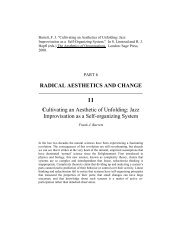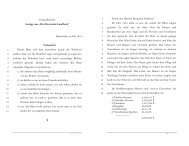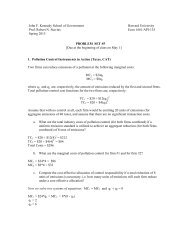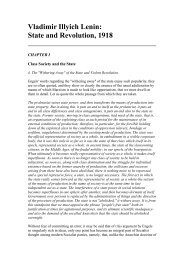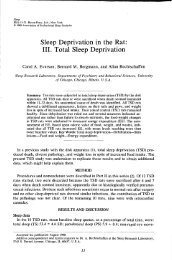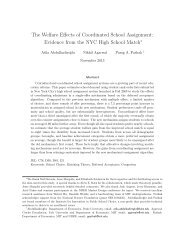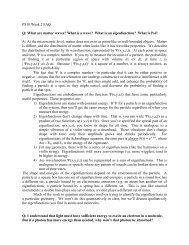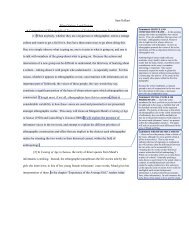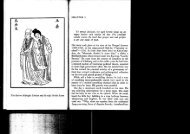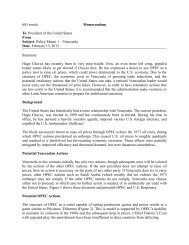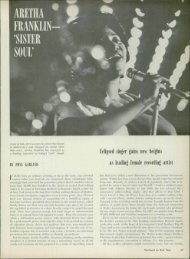What Did You Do in the War, Mutti? Courageous Women ... - iSites
What Did You Do in the War, Mutti? Courageous Women ... - iSites
What Did You Do in the War, Mutti? Courageous Women ... - iSites
Create successful ePaper yourself
Turn your PDF publications into a flip-book with our unique Google optimized e-Paper software.
592 Robert G. Moeller<br />
a reformed army could no longer be structured around models of<br />
‘patriarchal subord<strong>in</strong>ation’ and ‘<strong>the</strong> power of fa<strong>the</strong>rs’. In <strong>the</strong> new German<br />
army ‘partners with <strong>the</strong> same worth as citizens are on <strong>the</strong> same level.’ 72<br />
For Adenauer, entry <strong>in</strong>to NATO, rearmament, and <strong>the</strong> suspension of <strong>the</strong><br />
Allied occupation statute were essential to achiev<strong>in</strong>g West German’s equal<br />
rights (Gleichberechtigung) <strong>in</strong> <strong>the</strong> <strong>in</strong>ternational arena. ‘We want to be sovereign<br />
<strong>in</strong> our own country, no longer an object, but a subject of world politics,’<br />
73 <strong>the</strong> chancellor expla<strong>in</strong>ed. The relations of equality evoked by<br />
Baudiss<strong>in</strong> and Adenauer were also on display <strong>in</strong> KMG, where ‘<strong>the</strong> power<br />
of fa<strong>the</strong>rs’ was out of place and where mo<strong>the</strong>rs—subord<strong>in</strong>ated to no patriarchs—confronted<br />
<strong>the</strong> fa<strong>the</strong>rs <strong>in</strong> military command as equals. Giehse,<br />
whose formidable Mutter Bergmann won her praise from critics as a ‘genu<strong>in</strong>e<br />
Mo<strong>the</strong>r Courage’, 74 faced <strong>the</strong> general, Ewald Balser, whose reputation<br />
was as ‘<strong>the</strong> fa<strong>the</strong>r figure of <strong>the</strong> <strong>the</strong>atre.’ 75 The relations of equality <strong>in</strong> difference<br />
captured <strong>in</strong> <strong>the</strong> film echoed throughout parliamentary debates over <strong>the</strong><br />
reform of <strong>the</strong> Civil Code, which featured a model of companionate marriage<br />
and <strong>the</strong> partnership of husband and wife, characterized by no ‘patriarchal<br />
subord<strong>in</strong>ation.’ The mutual respect required by <strong>the</strong> new German army could<br />
emerge from a dialogue between fa<strong>the</strong>rs and mo<strong>the</strong>rs, equal partners <strong>in</strong><br />
determ<strong>in</strong><strong>in</strong>g what was best for West Germany’s youth.<br />
In a series of <strong>in</strong>terviews with former officers, published <strong>in</strong> 1951, Adelbert<br />
We<strong>in</strong>ste<strong>in</strong> presented <strong>the</strong> case for an Armee ohne Pathos that would<br />
scrupulously avoid excessive zeal and ‘excessive ardour’ (Überschwung).<br />
The ‘<strong>in</strong>nere Führung’—which has been translated as ‘<strong>in</strong>ner leadership’,<br />
‘moral leadership’ and ‘moral education’—of <strong>the</strong> new military forces<br />
described at length by Baudiss<strong>in</strong> should be based on reason, self-control,<br />
and a moral order that filled <strong>the</strong> <strong>in</strong>dividual before <strong>the</strong> <strong>in</strong>dividual filled <strong>the</strong><br />
uniform. It was essential to reconstruct <strong>the</strong> ‘right traditional attitude and<br />
live it <strong>the</strong> way that suits our times.’ 76 KMG suggested that <strong>the</strong>re was no<br />
shortage of positive traditions on which reformers could draw. Good men<br />
had borne <strong>the</strong> uniform of <strong>the</strong> Wehrmacht, but <strong>in</strong> a democratic Germany,<br />
even <strong>the</strong> best men needed some help. Mo<strong>the</strong>rs—at <strong>the</strong> core of German<br />
families—were <strong>the</strong> ones who could provide it.<br />
Among <strong>the</strong> lessons that mo<strong>the</strong>rs had to offer was a keen sense of when it<br />
was rational to violate orders. The men <strong>the</strong>y confront compla<strong>in</strong> that <strong>the</strong>y are<br />
72<br />
Schubert, Wolf Graf von Baudiss<strong>in</strong>, pp. 215 16.<br />
73<br />
Richard Tüngel, ‘Wir s<strong>in</strong>d ke<strong>in</strong>e Phäaken mehr’, Die Zeit (7 Oct. 1954), quoted <strong>in</strong> Ehlert,<br />
‘Innenpolitische Ause<strong>in</strong>andersetzungen’, p. 270.<br />
74<br />
Dirk Henn<strong>in</strong>g, ‘E<strong>in</strong>e Mutter mit Courage’, Schwäbische Landeszeitung (9 July 1955).<br />
75<br />
‘Vaterfigur des Theaters: Zum Tode des Schauspielers Ewald Balser’, Frankfurter Neue Press<br />
(18 April 1978).<br />
76<br />
Count Wolf Baudiss<strong>in</strong>, ‘The New German Army’, Foreign Affairs, 34, 1 (1955), pp. 1 13, quotation<br />
p. 9, translated as ‘Die neue deutsche Bundeswehr’, <strong>in</strong> Schubert, Wolf Graf von Baudiss<strong>in</strong>; see<br />
also Large, Germans to <strong>the</strong> Front, p. 177.



